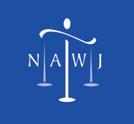NAWJ CONTINUES TO PUSH NALP FOR TRANSPARENCY IN EQUITY PARTNER DATA, CITING JUSTICE AND NEED FOR DIVERSITY
Written by National Association of Women Judges|April 10, 2010|News Archive
WASHINGTON, D.C - The National Association of Women Judges has been joined by prominent lawyers across the country in asking the National Association for Law Placement (NALP) to reconsider its recent turn-about in the face of law firm pressure. NALP's decision to step back from seeking the collection of important partnership data deprives the profession - as well as law schools and law students - of crucial information. NALP's annual survey is among the most trusted source of information about law firms in the country, and its data is an important source of information about the state of the legal profession.
NALP had responded favorably to a proposal, advanced in 2008 by Massachusetts Appeals Court Justice Fernande RV Duffly, then President of NAWJ, and the Massachusetts Women's Bar Association, that it require law firms to distinguish between equity and non-equity partners in the demographic information reported about their lawyers. This would have given law students seeking employment with law firms important data about the numbers of women and minority lawyers who have achieved full equity status, enabling them to make informed decisions about opportunities for advancement to genuine leadership positions. After studying the issue, NALP agreed and included questions about equity and non equity partners in its annual suirvey that was sent to its member law firms in January 2010. Just a few weeks later, however, these questions were removed from the questionnaire, apparently in response to resistance by unidentified law firms, citing privacy reasons.
Signing on to the letter asking that NALP reconsider its decision are prominent leaders of the legal profession from across the country, including the nation's leading bar associations, members of a national consortium of organizations that seek to advance women in the profession, deans of the country's major law schools, and partners in some of the country's top law firms. NAWJ past president Duffly decided that letting the matter recede from public view would not advance the interests of justice that she has worked her entire legal career to advance. Justice Duffly stated: "There are so many reasons why women and lawyers of color should have accurate data about their real prospects for achieving equity partner status. For me, it is simply a matter of justice. Leaders in the legal profession become members of the judiciary or influence the selection of those who do. Until women and minority lawyers are admitted to the ranks of real power and influence, it is not just the upper echelons of our law firms but the judiciary that will remain predominantly male and white, and we as a nation will continue to fall short of attaining the goal of equal justice."
NAWJ's current president, Dana Fabe, also emphasized the importance of collecting accurate information about how women are succeeding in the legal profession. "NAWJ cannot stand by as year after year, the percentage of women and minorities on the federal and state courts remains stagnate. As Dr. Martin Luther King, Jr. reminded us, justice cannot be a far-off ideal for a distant tomorrow -- it must be a living reality of today."
NAWJ and the representatives of national bar associations and organizations that seek to advance women and minorities in the profession are hoping to meet with members of NALP's Board this month to change their minds.
About the National Association of Women Judges
Founded in 1979, the National Association of Women Judges (NAWJ) is a non-profit organization of more than 1,250 federal, state, administrative, tribal and military judges from across the country. For over 32 years, NAWJ has served as the nation's leading voice for jurists dedicated to: promoting the judicial role in protecting the rights of individuals under the rule of law through strong, committed, diverse judicial leadership; fairness and equality in the courts; equal access to justice; providing judicial education on cutting-edge issues; and the advancement of women at all levels of the judiciary to accurately reflect their full participation in a democratic society.
For more information about NAWJ, please contact Marie Komisar (202) 393-0222 or mkomisar@nawj.org.
